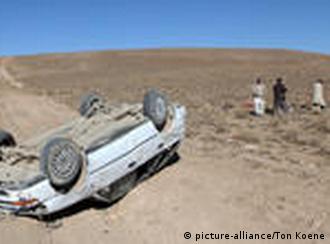July 4, 2012
The killings of the Shiite Muslims continue un-abated in those areas under the control of the military and Para-Military forces where the banned Muslim organizations operate freely and without hindrance.
In the latest killings on June 28 at least 13 pilgrims were martyred and several others injured in a bomb blast attack on Zaireen's bus in Hazar Ganji, Quetta, the capital of Balochistan where the city remains under the tight control of the Frontier Corp (FC), a unit of the Pakistan Army. In the city it is not possible for anyone to move without being body searched by the FC and other law enforcement agencies yet the militants pass freely. The reports say that a police officer was also killed in the attack.
The bus carrying at least 40 persons from a Shiite religious group was coming from Taftan, Pakistan's border city with Iran. The pilgrims had gone to Iran on a pilgrimage tour. The banned organization, Lashkar-e-Jhangvi (LeJ) has claimed responsibility for the massacre.
During the month of June alone, 31 Shiites were killed in the Quetta and Mand areas of Balochistan by the LeJ bomb blasts and target killings. All of them were from Hazara ethic groups who are associated with the Shiite sect of Islam.
More than 600 persons from the Shiite sect of Islam have been killed during the past four years. According to the provincial home department report more than 400 Shiites and Hazaras had been killed in more than 200 incidents in the four-year span through 2011 and about 100 pilgrims had been killed in the first half of this year alone.
Balochistan province, the Gilgit and Baltistan and Kurram agency of northern area, is well known as a Federally Administered Tribal Area (FATA) and has become a killing ground for the Shiite sect that consists of 24 percent of the Muslim population in Pakistan. These are the places where the contingents of the Pakistan army, its Para-Military forces and the Frontier Corps (FC) are stationed and control all the roads, besides having check posts all around the major cities. In the same areas the banned militant groups are operating along with the military organizations and in these areas the military provide safe passage to them. There is also a huge presence of spies from the infamous intelligence agency, the ISI. As a result banned Islamic militant organizations feel at liberty to operate freely under the patronage of the law enforcement agencies.
In Karachi alone, which is not considered a military zone, not a month passes without target killings of Shiites and the militant organisations overtly take collections from the streets to fund their operations.
The civilian intelligence agency, the Intelligence Bureau (IB), in its latest report has warned that organisations such as Sipah-e-Sahaba Pakistan (SSP), Lashkar-e-Jhangvi (LeJ) and Jundallah are more powerful now than they were in the '80s and '90s when they wreaked havoc across the country through sectarian attacks.
"Even today they pose a challenge as big as al Qaeda and they are getting more powerful. Imagine where they will be in a couple of years," said an official who was a member of the IB team that prepared the report. Some of the contents of the report were shared with The Express Tribune, which stated that the SSP and LeJ had already extended their network outside their traditional strongholds in South Punjab, the southern districts of Khyber-Pakhtunkhwa and the Pakhtun belt of Balochistan, including Quetta.
"Now they are everywhere…from interior Sindh to the base of the Himalayas," added the official. The SSP and LeJ were among several outfits that were banned by former military ruler Pervez Musharraf back in 2002, but their infrastructure and manpower remained untouched.
An activist of the SSP who would only give his last name said, "We went into hiding for some years but our system was very much there,"
The killings of Shiites, Ahmadis, Christians, Hindus and other communities from religious minority groups are of no concern to the state as a whole and the elected representatives of the assemblies including the governments of Pakistan and the provinces. Massacres are taken, nowadays, as routine issues and the main concern is the numbers of deaths. If the body count is lower than the previous one it is generally thought that it was not so important.
The so-called 'independent judiciary' turns a blind to these massacres though it is famous for taking Sou-Moto action in politically sensitive cases. In fact, the courts have released many militants, at least one of which has spoken in public calling for the killing of Shiites in the service of Islam.
In one instance, a militant, Malik Ishaq, filed action in the session court of Rahim Yar Khan calling for the banning of the Shiite Azan (the call for prayers). The court issued notice to the police to take action on the plea even though it was beyond its authority to do so.
This is just further proof of the appeasement attitude of the government and the courts towards the militants and terrorists. Where is the protection guaranteed in the Constitution of Pakistan for freedom to profess religion and to manage religious institutions? Section 20 (b) states:
Every religious denomination and every sect thereof shall have the right to establish, maintain and manage its religious institutions.
Furthermore, Pakistan has ratified the UN International Covenant on Civil and Political Rights (ICCPR) and its article 18 which binds the state parties to:
....assure freedom of thought on all matters, personal conviction and the commitment to religion or belief, whether manifested individually or in community with others.
The Asian Human Rights Commission urges the government of Pakistan and its parliament to bring to an immediate halt the targeted killings of Shiites and all other minority and religious groups. The government must also conduct independent enquiries into the massacre of Shiites and provide special attention to the killings of persons from religious minorities. Legal action must be taken against the perpetrators of the violence and also the police and judicial officers that turn a blind eye to these atrocities.
Document Type :
Statement
Document ID :
AHRC-STM-136-2012
Countries :
PakistanIssues :
Extrajudicial killings,
Military





